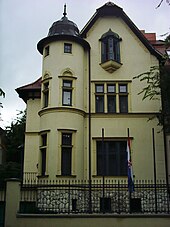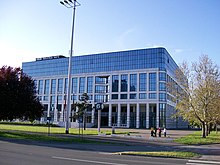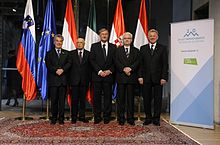Croatia–Hungary relations
 | |
Croatia |
Hungary |
|---|---|
The foreign relations between Croatia and Hungary are bound together by shared history, political development and geography. The two states established diplomatic relations on 18 January 1992 following the dissolution of Yugoslavia and the independence of Croatia.
In 1102 the previously independent
Croatian and Hungarian high-ranking officials usually meet several times a year. Trade between Croatia and Hungary amounted $1.020 bln in 2012,[1][2] largely consisting of Hungarian exports to Croatia. Hungarian tourists contribute significantly to Croatian tourism; in 2009, a total of 323,000 visited Croatia, including the Hungarian Prime Minister Viktor Orbán who has spent his summer holidays in Dalmatia for last few decades. Both countries coordinate the development of cross-border infrastructure. Pan-European corridors Vb and Vc connect Budapest to the Adriatic Sea via Zagreb and Osijek. Both countries have sizable minorities living across their common border, and both have passed laws to protect their minority rights.
Croatia and Hungary are parties to 96 bilateral treaties and members of a number of multinational organizations, including NATO and the European Union. Croatia has an embassy in Budapest a general consulate in Pécs and a consulate in Nagykanizsa, while Hungary has an embassy in Zagreb, a general consulate in Osijek and honorary consulates in Rijeka, Split and Dubrovnik.
Present
Diplomatic relations
This article needs to be updated. (November 2017) |

| Location | Type | Head |
|---|---|---|
| Budapest | embassy |
Ivan Bandić |
| Pécs | consulate | Ljiljana Pancirov |
| Nagykanizsa | consulate | Mijo Karagić |
| Location | Type | Head |
|---|---|---|
| Zagreb | embassy |
Gábor Iván |
| Rijeka | consulate | Miran Ključariček |
| Split | consulate | Ivo Staničić |
High level visits
Croatian and Hungarian high-ranking officials (including heads of state, prime ministers and foreign ministers) meet several times a year. In addition, Croatian and Hungarian governments have occasionally held joint sessions since January 2006.[7][8]
| Date | Location | Note |
|---|---|---|
| 19 June 2012 | Budapest | Speakers of the National Assembly of Hungary Boris Šprem and László Kövér meet
|
| 7 May 2012 | Budapest | Croatian prime minister Zoran Milanović meets Hungarian prime minister Viktor Orbán |
| 24 February 2012 | Budapest | Croatian foreign and European affairs minister Vesna Pusić and János Martonyi (Hungarian foreign minister) meet |
| 7 December 2011 | Olgamajor | Speakers of the Croatian Parliament and the National Assembly of Hungary Luka Bebić and László Kövér meet |
| 29–30 September 2011 | Budapest | President of Croatia Ivo Josipović visits Budapest and meets Hungarian president Pál Schmitt |
| 8 February 2011 | Zagreb | Croatian prime minister Jadranka Kosor meets Hungarian prime minister Viktor Orbán |
| 24 January 2011 | Budapest | Croatian justice minister Dražen Bošnjaković meets Hungarian Administration and Justice minister Tibor Navracsics
|
| 23 December 2010 | Zagreb | Croatian prime minister Jadranka Kosor meets Hungarian deputy prime minister Tibor Navracsics |
| 28 October 2010 | Budapest | Gordan Jandroković (Croatian foreign minister) and János Martonyi (Hungarian foreign minister) meet |
| 1 October 2010 | Zagreb | Hungarian president Pál Schmitt meets Croatian president Ivo Josipović and Croatian prime minister Jadranka Kosor, and visits Osijek and Varaždin |
| 10 September 2010 | Zagreb | Croatian prime minister Jadranka Kosor and Hungarian deputy prime minister Tibor Navracsics attend the Consequences of EU Membership for the Judiciary conference |
| 22 July 2010 | Budapest | Hungarian prime minister Viktor Orbán meets Croatian prime minister Jadranka Kosor |
| 13 July 2010 | Zagreb | Croatian prime minister Jadranka Kosor and Gordan Jandroković (Croatian foreign minister) meet Pál Schmitt, Speaker of the National Assembly of Hungary and President-elect of Hungary at the time |
| 9 July 2010 | Dubrovnik | The 5th Croatia Summit is held, attended by Croatian president Ivo Josipović, Croatian prime minister Jadranka Kosor and Hungarian foreign minister János Martonyi
|
| 16 April 2010 | Pécs | Trilateral meeting of Croatian, Hungarian and Serbian presidents: Ivo Josipović, László Sólyom and Boris Tadić |
| 16 March 2010 | Budapest | Visit of Croatian president Ivo Josipović |
| 18 January 2010 | Zagreb | Visit of Hungarian prime minister Gordon Bajnai |
| 21 November 2009 | Barcs | Presidents of Croatia and Hungary (Stjepan Mesić and László Sólyom) meet on the occasion of Croatian Day in Hungary |
| 5 November 2009 | Budapest | Presidents Stjepan Mesić and László Sólyom meet at the World Scientific Forum |
| 17 September 2009 | Barcs | Prime ministers Jadranka Kosor and Gordon Bajnai co-chair a joint session of the Government of Croatia and the Government of Hungary |
| 9 September 2009 | Zagreb | Foreign ministers Gordan Jandroković and Péter Balázs meet to prepare a joint session of the Croatian and Hungarian governments |
| 9–10 July 2009 | Dubrovnik | Prime ministers Jadranka Kosor and Gordon Bajnai meet at the Croatia Summit 2009 |
| 27 April 2009 | Luxembourg |
Foreign ministers Gordan Jandroković and Péter Balázs meet during the fifth EU-Croatia Stabilisation and Accession Council |
| 13 March 2009 | Zagreb | Hungarian foreign minister Kinga Göncz visits Croatian foreign minister Gordan Jandroković and meets with prime minister Ivo Sanader and president Stjepan Mesić |
Economy and infrastructure

Trade between Croatia and Hungary amounted to €625,083 in 2009, a decrease from €894,270 in 2008. In 2009 Croatian exports to Hungary reached €132,474, while Hungarian exports to Croatia were worth €492,609. Overall, the 2009 trade volume represented 2.75 percent of total Croatian
Hungarian tourists contribute significantly to the Croatian tourist industry; in 2009, a total of 323,000 Hungarians visited Croatia as tourists. A total of 1.644 million overnight stays were made by Hungarian tourists in that year alone, ranking Hungarian tourists seventh in the number of nights spent in Croatia (behind the Germans, Slovenes, Italians, Austrians, Czechs and Dutch). At the same time, the Hungarian tourists spent more than 143 million kuna (c. €19 million) in Croatia, representing a sharp increase from 69.5 million kuna (c. €9.3 million) spent in 2008. In 2009, 103,000 Croatians visited Hungary (excluding family and friend visits) in 356,000 overnight stays, spending 204,000 kuna (c. €27,000). This spending represented a 250-percent increase from 2008.[11]
Croatia and Hungary coordinate the development of infrastructure, especially transportation routes.
Minorities and migrations


According to the 2001 census there are 16,595
The Hungarian government recognised Croats as a minority native to Hungary; it has decided to implement the optional regulations of the
Cultural and scientific cooperation
Croatia and Hungary have agreed to the Cultural Cooperation Programme, which defines cooperation and cultural exchange in the fields of music, theatre and dance, and with respect to the arts, museums, galleries, literature, publishing, libraries, archives, film and cultural-heritage protection. The programme was agreed to on 7 November 2011 in Budapest by secretaries of the
Bilateral treaties and multinational organizations

Croatia and Hungary have either signed or succeeded 133 different treaties and other agreements. Some were originally signed by Hungary and
Croatia and Hungary are members of several multinational organizations, including the
History
Personal union


When
Habsburg rule

During the 1830s and 1840s
Treaty of Trianon and World War II

The
The
Fall of Communism and Croatian independence
Hungary recognised Croatian independence on 15 January 1992 (with the rest of the
Economic links
| Million (€) | 2012 | 2013 | 2014 | 2015 |
|---|---|---|---|---|
| Export | 1,266.71 | 1,115.98 |
1,188.7 |
1,491.1 |
| Import | 341.77 | 340.19 |
419.76 |
439.02 |
| Balance | 924.95 | 775.78 | 768.97 | 1,052.13 |
See also
- Foreign relations of Croatia
- Foreign relations of Hungary
- Hungarians of Croatia
- Croats of Hungary
- Hungary–Yugoslavia relations
References
- ^ "OEC - the Observatory of Economic Complexity | OEC".
- ^ "OEC - the Observatory of Economic Complexity | OEC".
- Ministry of Foreign Affairs (Hungary). Archived from the originalon 14 August 2012. Retrieved 18 December 2011.
- ^ a b "Date of Recognition and Establishment of Diplomatic Relation". Ministry of Foreign and European Affairs (Croatia). Archived from the original on 13 August 2010. Retrieved 18 December 2011.
- ^ a b c "Diplomatic Missions and Consular Offices of Croatia". Ministry of Foreign and European Affairs (Croatia). Archived from the original on 11 November 2011. Retrieved 18 December 2011.
- ^ "Diplomatic Missions and Consular Offices to Croatia". Ministry of Foreign and European Affairs (Croatia). Archived from the original on 6 May 2012. Retrieved 18 December 2011.
- Ministry of Foreign Affairs (Hungary). Retrieved 20 June 2012.[permanent dead link]
- Croatian Government. 17 September 2009. Archived from the originalon 17 September 2013. Retrieved 20 June 2012.
- ^ "Godišnjak MVPEI-a" [MFAEI Yearbook] (in Croatian). Ministry of Foreign and European Affairs (Croatia). Archived from the original on 29 December 2011. Retrieved 18 December 2011.
- ^ "Priopćenja" [Communiques] (in Croatian). Ministry of Foreign and European Affairs (Croatia) - Embassy of Croatia, Budapest. Archived from the original on 5 January 2013. Retrieved 8 July 2012.
- ^ a b c d e "2010 – Statistical Yearbook of the Republic of Croatia" (PDF). Croatian Bureau of Statistics. December 2010. Retrieved 7 October 2011.
- ^ "Hungary in Figures 2009" (PDF). Hungarian Central Statistical Office. 2010. Retrieved 18 December 2011.
- ^ Mladen Pleše (22 July 2003). "Mađarski investicijski bum u Hrvatskoj" [Hungarian investment boom in Croatia]. Nacional (weekly) (in Croatian). Archived from the original on 16 April 2009. Retrieved 18 December 2011.
- INA. Archived from the originalon 18 July 2011. Retrieved 24 July 2011.
- ^ "Transport : launch of the Italy-Turkey pan-European Corridor through Albania, Bulgaria, Former Yugoslav Republic of Macedonia and Greece". European Union. 9 September 2002. Retrieved 6 September 2010.[permanent dead link]
- Ministry of Sea, Transport and Infrastructure. 22 October 2008. Archived from the originalon 8 October 2017. Retrieved 14 October 2010.
- ^ "Otvoren most 'Mura' i dionica Goričan - Letenye" [Mura Bridge ad Goričan-Letenye section open] (in Croatian). Nova TV (Croatia). 22 October 2008. Retrieved 7 April 2012.
- ^ Plamenko Cvitić (25 August 2008). "Nova pruga za uzlet Rijeke" [New railway for rise of Rijeka]. Nacional (weekly) (in Croatian). Archived from the original on 31 August 2012. Retrieved 18 December 2011.
- ISBN 978-953-7491-02-2. Archived from the original(PDF) on 9 January 2014. Retrieved 7 April 2012.
- ^ Željko Bukša (4 August 2011). "Proradio novi plinovod između Hrvatske i Mađarske" [A new gas pipeline between Croatia and Hungary opens]. Vjesnik (in Croatian). Archived from the original on 14 June 2012. Retrieved 18 December 2011.
- ^ "Mateša i Orban pustili u pogon dalekovod Hrvatska - Mađarska" [Mateša and Orban start operation of Croatia-Hungary power line] (in Croatian). Croatian Radiotelevision. 12 November 1999. Archived from the original on 5 March 2016. Retrieved 18 December 2011.
- ^ Nevenka Špoljarić (26 February 2010). "Dalekovod Ernestinovo - Pečuh u funkciji u ožujku" [Ernestinovo-Pécs power line operational in March]. Glas Slavonije (in Croatian). Retrieved 18 December 2011.
- Narodne Novine(in Croatian). 20 November 1996. Retrieved 18 December 2011.
- ^ "Population by mother tongue, ethnic minorities and sex, 1900–2001". Hungarian Central Statistical Office. Retrieved 18 December 2011.
- ^ "Ustav Republike Hrvatske" [Constitution of the Republic of Croatia]. Narodne Novine (in Croatian). 9 July 2010. Retrieved 11 October 2011.
- Sabor. 28 November 2008. Archived from the originalon 9 May 2013. Retrieved 27 October 2011.
- Croatian Government. Archived from the originalon 26 April 2012. Retrieved 18 December 2011.
- Narodne Novine(in Croatian). 23 April 2003. Retrieved 9 November 2011.
- ^ "Pozdravne riječi" [Welcoming remarks] (in Croatian). Croatian State Self-Government (Hungary). 1 July 2011. Archived from the original on 21 April 2012. Retrieved 18 December 2011.
- Ministry of Foreign Affairs (Hungary). 2000. Archived from the original(PDF) on 28 May 2013. Retrieved 18 December 2011.
- ^ "Mađarski Hrvati kukali predsjedniku" [Hungarian Croats complain to the president] (in Croatian). t-portal. 30 September 2011. Retrieved 18 December 2011.
- ^ "Hrvatska manjina u Republici Mađarskoj" [Croatian minority in the Republic of Hungary] (in Croatian). Ministry of Foreign and European Affairs (Croatia). Archived from the original on 18 December 2012. Retrieved 18 December 2011.
- Ministry of Culture (Croatia). 8 November 2011. Retrieved 18 December 2011.
- Ministry of Science, Education and Sports (Croatia). Archived from the originalon 7 November 2011. Retrieved 18 December 2011.
- doi:10.1093/oxfordjournals.ejil.a035802. Archived from the original(PDF) on 29 May 2011. Retrieved 18 December 2011.
- ^ a b "List of international treaties and international acts concluded between the Republic of Croatia and the Republic of Hungary". Ministry of Foreign and European Affairs (Croatia). Archived from the original on 17 February 2013. Retrieved 18 December 2011.
- ^ "Multilateral Relations". Ministry of Foreign and European Affairs (Croatia). Archived from the original on 24 January 2012. Retrieved 18 December 2011.
- ^ "Ministry of Foreign Affairs - Organisation". Government of Hungary. Archived from the original on 21 June 2012. Retrieved 8 July 2012.
- ^ Valentina Pop (13 April 2011). "EU endorses 'Danube strategy' despite environmental concerns". EUobserver. Retrieved 18 December 2011.
- ^ ISSN 1332-4853. Retrieved 16 October 2011.
- ^ Sabor. Archivedfrom the original on 2 December 2010. Retrieved 18 October 2010.
- ^ ISBN 978-1-57607-800-6. Retrieved 18 October 2011.
- ISSN 1332-2567. Retrieved 7 October 2011.
- ISSN 1845-4380. Retrieved 17 October 2011.
- ASIN B0062HY9IY. Retrieved 8 July 2010.
- ISBN 978-3-85002-284-2. Retrieved 17 October 2011.
- ^ Craig, G.A. (1966). Europe since 1914. Holt, Rinehart and Winston, New York.
- ^ "Text of the Treaty, Treaty of Peace Between The Allied and Associated Powers and Hungary And Protocol and Declaration, Signed at Trianon June 4, 1920". Retrieved 10 June 2009.
- The Columbia Encyclopedia. 2009.
- ISBN 978-1-85109-420-2.
Virtually the entire population of what remained of Hungary regarded the Treaty of Trianon as manifestly unfair, and agitation for revision began immediately.
- ISBN 978-1-85109-420-2. Retrieved 27 October 2011.
- ISBN 0-521-55879-4.
- ISBN 978-1-891227-19-6. Retrieved 18 December 2011.
- ^ "Foreign relations of the United States, 1946. Paris Peace Conference : documents". University of Wisconsin Digital Collections Center. Retrieved 18 December 2011.
- ISBN 978-0-7425-5542-6. Retrieved 18 December 2011.
- ^ "Ceremonial session of the Croatian Parliament on the occasion of the Day of Independence of the Republic of Croatia". Official web site of the Croatian Parliament. Sabor. 7 October 2004. Archived from the original on 14 March 2012. Retrieved 29 July 2012.
- ^ "Hungary Eases Dissent Curbs". The New York Times. 12 January 1989. Retrieved 18 December 2011.
- ^ John Pomfret; David B. Ottaway (12 May 1996). "U.S. Allies' Arms Aid to Bosnia Detailed". Los Angeles Times. Retrieved 18 December 2011.
- Ministry of Foreign Affairs (Hungary). Archived from the originalon 13 December 2011. Retrieved 18 December 2011.
- ^ "MKIK Gazdaság- és Vállalkozáskutató Intézet" (PDF). Archived from the original (PDF) on 30 December 2016. Retrieved 29 December 2016.


